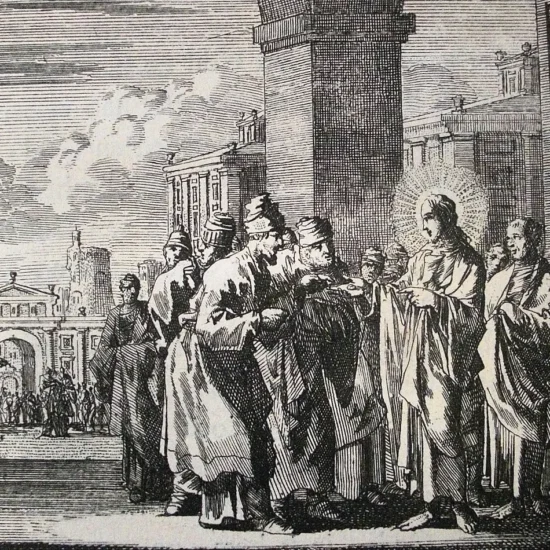
Albert Einstein once quipped, “The hardest thing in the world to understand is the income tax.”
 With Tax Day (April 15) quickly approaching, U.S. citizens across the country are currently thinking a lot about taxes. Many will prepare their own tax returns, while others will seek professional assistance.
With Tax Day (April 15) quickly approaching, U.S. citizens across the country are currently thinking a lot about taxes. Many will prepare their own tax returns, while others will seek professional assistance.
Either way, almost all are hoping for good news, which usually translates into large returns or lower taxes.
As I wrote a check to the IRS this week, I started thinking about what the Bible says about taxes and the responsibility of Christians to pay them. To be honest, I was feeling guilty about my disdain for owing this year.
But, what if, as citizens of both an eternal and temporal kingdom, it is my responsibility to pay my taxes as a means of loving my neighbor?
As citizens of two kingdoms, Christians have a unique perspective on taxation. Jesus, himself, addressed a question about paying taxes.
In the Synoptic Gospels, church leaders attempted to trap him with this question, “Is it lawful to pay taxes to the emperor or not?” His answer was politically and spiritually brilliant (see Matthew 22, Mark 12 and Luke 20).
Showing any support for Roman taxation would have been politically devastating for Jesus, but he merely points out the obvious.
“Give to the Emperor the things that are the Emperor’s,” Jesus responded as he held a denarius with the Emperor’s image engraved on it.
The second part of his answer reveals an even greater responsibility: “Give to God the things that are God’s.”
Jesus’ response revealed two enduring principles: (1) a healthy separation between church and state and (2) the responsibility Christians have to pay taxes for the common good.
Something I have never noticed until now is what comes almost immediately after the taxation question.
Trying to trap Jesus once again, and with the echoes of their question about taxes hanging in the air, the religious leaders asked, “Which commandment is the greatest?”
Jesus quickly responded, “You shall love the Lord your God with all your heart, and with all your soul, and with all your mind. You shall love your neighbor as yourself. On these two commandments hang all the law and the prophets.”
In the context of these questions, serious Bible readers begin to realize that Jesus is transcending politically charged issues by offering what it means to be humans concerned about the greater good.
Don’t believe me? Let’s look at what the Apostle Paul has to say.
In Roman 13, Paul encouraged his readers to submit themselves to governing authorities by doing what is good. In a litany of good deeds, Paul mentioned paying revenue to whom it is owed, respect to whom it is due and honor to whom it is allocated.
However, the very first deed he mentioned was that Christians were called to pay taxes (Romans 13:6).
Then, in what seems like a large pivot, the Apostle moves quickly into loving one’s neighbor.
After careful consideration, Paul’s point becomes crystal clear: The reason we keep the law – both civil and divine – is that by doing so we demonstrate our love for neighbor.
When Jesus-followers keep the commandments, we are showing love for neighbor. Wrapped inside of this provocative thought, Paul argues that by paying taxes we are loving our neighbors.
I know, I know. This seems nonsensical, right? But, think about it: What do taxes fund in society?
- The teaching of the community through public education.
- The protection of the community through police and fire departments.
- The defense of community through support of the military.
- The upkeep of community through funding infrastructure.
- The care for the environment through accountability.
- The wisdom of community through judicial oversight.
- The compassion of the community through social services.
And, there are so many more expressions. These areas of service are tangible results when citizens pay their taxes.
For Jesus-followers, they are an extension of loving our neighbors. I know it sounds odd coming off the tongue but try speaking it from the heart.
For me, understanding taxes as a means for me to love my neighbor helps ease the pain of writing a check this year.
More so, this way of looking at taxes provides a theological foundation, revealing my responsibility as a Jesus-follower when it comes to my attitude and practice of paying my taxes.
The late Supreme Court Justice Oliver Wendell Holmes once reminded citizens about the frustrations and benefits of paying taxes: “I hate paying taxes. But I love the civilization they give me.”
Taxes are a reality of life, so instead of despising the idea, let’s start seriously considering the benefits they provide.
If we were honest and looked around, I think we would recognize the blessings of taxes as they provide for the common good.
Is the system perfect? Far from it.
However, with each year that passes I hope the taxes I pay will help make this community of ours a little more beloved and a little more perfect.
An EthicsDaily.com’s documentary, “Sacred Texts, Social Duty,” addresses taxation from the perspective of the Abrahamic faith traditions. Learn more and watch the film online for free here.
This article originally appeared on EthicsDaily.com.




